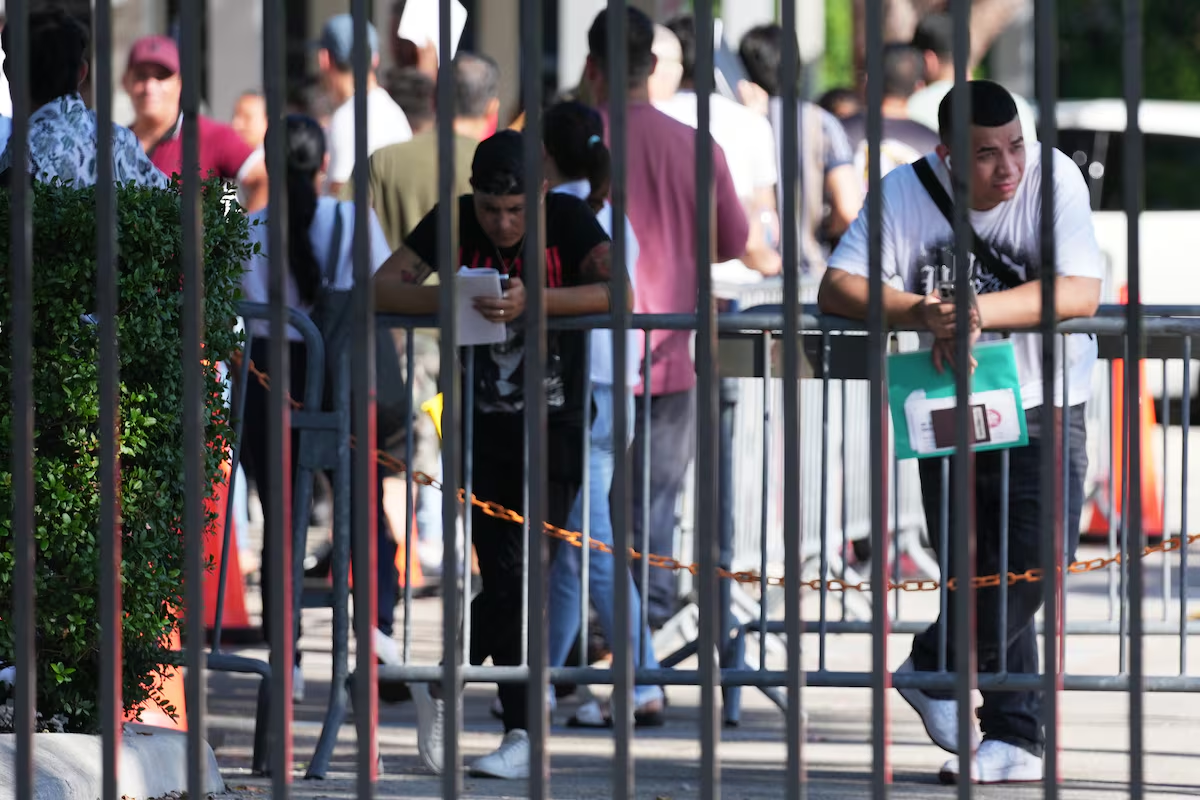‘I’m angry with my president:’ Trump voters in Florida confront the fallout of his policies a year before the midterms

A year after Donald Trump’s election win that gave him the key to the White House for the second time, many Latino Trump voters in Florida who sealed the state’s status as a Republican stronghold are now questioning their decision. Trump’s manifesto of economic prosperity and law and order clashes with a reality that continues to punish disadvantaged families. As the months have passed, frustration and regret have grown among those most affected by the rising cost of living, cuts to social programs and an immigration agenda that has torn the Hispanic community apart.
Across Florida, the disenchantment of residents, business owners, and community activists is palpable. The list of complaints includes the disruption to government aid as a result of the government shutdown, the unstoppable rise in the cost of rest, and persistent inflation. Two judges have said that the government should continue to provide food aid that was scheduled to be suspended on Nov. 1. While the government said it will comply with the rulings, the 42 million Americans who rely on the Supplemental Nutrition Assistance Program (SNAP) for food are likely to receive the benefits piece meal due to the disruption.
The consequences will be felt especially hard in Miami-Dade County, where the shift of the Latino vote from Democrat to Republican was key to Trump’s victory last year. Here, about 215,000 households (about 24%) rely on SNAP, one of the highest rates in the country. In other words, more than half a million people.
Alexis Maria, a 35-year-old single mother born in West Palm Beach who works as a doctor’s assistant, is among them. She says she voted for Trump because she thought he would be a better leader. “The last time Trump was president, I made more money than ever in my career. Prices were low. Gasoline was cheap. I remember going on vacation. Interest rates were lower. Now everything is out of control. I can’t even afford the air we breathe. Now I see that I made the wrong decision,” she says.
Alexis has been receiving food stamps since her first child was born. She has two children, ages 12 and six. “The government is the reason we’ve been able to eat most of the month, and the other half, I’m counting each cent to survive, what with food prices and rent,” she says. She is concerned that SNAP will be suspended, despite the judges’ ruling. With the high cost of food and no coupons, her children “will have nothing to eat.”
Alexis says she has been looking for information about places where they donate food, such as churches and aid organizations, and has even had to miss work to be able to go get food. “Now I need to go three times a week to feed my family, and the lines every week have been longer. This sums up why I’m angry with the president. His decisions are now [adversely] affecting the lower and middle class. They only benefit the rich,” she says.
Simone Matthew of the American Federation of Government Employees volunteers at a food distribution center organized by the union and Feeding South Florida to assist federal employees during the government shutdown, Tuesday, Oct. 28, 2025, in Dania Beach, Fla.Rebecca Blackwell (AP)
Cases like that of Alexis illustrate how citizens have been directly affected by the systematic federal cuts, carried out by the Department of Government Efficiency — Elon’s Musk’s infamous DOGE — and the government shutdown, which has now run for a month with no end in sight. Congress has failed to agree on the budget for the new fiscal year, which began October 1.
In Congress, Democratic lawmakers are pushing for the budget to include an extension of Obamacare otherwise known as the Affordable Care Act (ACA) — which lowers the cost of health insurance, and is about to expire; they also want to reverse the cuts to Medicaid, the public health program for the elderly, low income individuals and those with a disability.
The Trump administration and practically the entire Republican caucus have been blaming the Democrats for the shutdown, falsely accusing them of wanting to give free health care to undocumented immigrants. This message is designed to win over public opinion, although polls suggest that it is not working. The lawsuits that later led to the rulings on the food assistance program have been another blow to the government’s arguments, as they undermine the idea that they are at the mercy of the Democrats.
But real politics is usually not so black and white, even less so in Florida. So, while the parties blame each other for the stalemate that is about to break the record set during Trump 1.0, some voters like Erick Pita, a 51-year-old Cuban who has been in the U.S. for 20 years, sides in this respect with the Republicans. “The fault lies with the Democrats, who are using the hardships of the population as a tool to apply pressure to get something they want politically,” he says. He doesn’t get food stamps, but his parents do.
“I didn’t vote for any of this.”
Others, meanwhile, focus their criticism on the lack of concrete action from both sides. Vanessa Brito, a 42-year-old election analyst and community activist from Miami who has been reporting on social media about what the end of SNAP benefits would mean, says that both political parties “are more concerned with how to win the next election than in helping” those in need — those who have been affected by the policies of this administration. Brito has been a political consultant for both parties but says she has decided to focus her experience on better understanding voters and advising campaigns on how to communicate more effectively with them.
“It’s clear that [people] are confused, and many don’t seem to directly blame the current administration, but they’re also not quick to blame Democrats,” Brito says. “Anger and fear dominate, which depoliticizes everything. For a county like Miami-Dade, which has one of the highest concentrations of seniors receiving SNAP — mostly Hispanic — that’s very telling,” Brito says. “A direct economic impact generates anger and fear, and that creates a space in which voters or residents seek support from whoever can offer it. Right now, they don’t care who is to blame. They care that politicians of both parties are more focused on blaming each other than on helping them.”
Among Brito’s followers there are personal stories that reflect anguish and regret. One is Michael Lyras, a 44-year-old American, who lives in Volusia County, near Orlando, in central Florida. Lyras studied addiction counseling in college but is currently disabled and receiving food stamps. He voted for Trump “all three times” but says he is upset with the way things are going: “I regret my last vote enormously,” he says.
“It was necessary to make changes, but not in this way, sacrificing our civil rights and liberties that are enshrined in our Constitution,” Lyras adds. “He [Trump] is turning this into a police state and he’s acting like an authoritarian. I didn’t vote for any of this” For some voters, the ultimate blow has been seeing neighbors or loved ones caught in the unstoppable machinery of deportation, which they deem unfair. They feel a mixture of guilt, anger and bewilderment.
Cuban Pita says he is “disappointed” by the Trump administration’s immigration agenda, which he considers “a Republican political manipulation… If you say you’re going to deport all criminals, even migrants, like me, they [voters] are happy with that. That is why the Latino vote was oriented towards Trump. People agreed with what the Republicans were saying in the campaign, which was: ‘I’m going to get rid of all criminals.’ But what Trump is doing is something else, and it is very cruel and very bad, and they are going to pay dearly.”
Food aid from the Second Harvest Food Bank, in Altamonte Springs, Florida, on October 31.Paul Hennessy (Anadolu vía Getty Images)
November 2024 was the first time Pita voted for Trump. “I don’t like Trump — either his approach or his ideas. He’s not presidential in the traditional sense of the word, but I thought the previous administration was terrible, things were going very badly, and the country was on the wrong track,” Pita says, referring to the Biden administration.
But not all Republican voters are disappointed. Some, like Kimberly Delgado, 28, maintain their support for Trump despite the difficulties they face. “What motivated me to vote for Trump was the immigration laws he was implementing, and also because the last four years with the Democrats in office were a disaster,” she explains.
A resident of Weston, northeast of Miami, Delgado says that although she works at a funeral home and her husband also works full-time, they can’t afford to feed their two children, and they have been receiving food stamps for four years. Delgado was born in the U.S. to Cuban parents and she assumes that the situation with the government shutdown is going to be difficult for many like them — people who work full-time and yet still need help due to the rising cost of living.
Local reaction
Democrat Miami-Dade Mayor Daniella Levine Cava, called on Florida congressmen last week to extend federal health subsidies and use emergency funds for “vital programs such as food, housing and health services.” Miami Republican Congresswoman Maria Elvira Salazar, who represents the 27th District, which includes a vast area of Miami-Dade, co-sponsored the Keep SNAP Funded Act, which advocates using emergency funds to finance the food aid program.
At the same time, major food banks and nonprofits in the Southwest — such as Feeding South Florida, Farm Share and United Way — have stepped up food distributions and donation drives. Dozens of smaller food banks and churches have also braced for a surge in demand.
Brito believes that, although the administration is Republican, deep down both sides of the political spectrum are responsible for the current crisis, and that the most vulnerable are the most affected. The result, rather than repudiation or support for either side, seems to be apathy. “One party goes to the extreme, and the other responds by going to the other extreme, while most people feel like political beggars. The two parties forgot that people kill themselves working simply to survive,” she says.
Sign up for our weekly newsletter to get more English-language news coverage from EL PAÍS USA Edition




